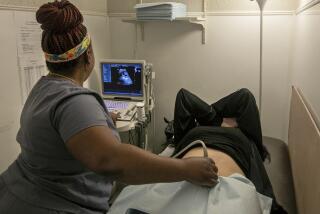Science / Medicine : Blood Test Finds Fetal Disorders
- Share via
For the first time, researchers have diagnosed fetal genetic disorders by taking blood samples from pregnant women, eliminating risk to the fetus. The new techniques rely on the fact that a very small number of fetal blood cells can make their way into a pregnant woman’s bloodstream through leaks in the placenta.
The cells are very rare in the mother’s bloodstream, however. The new technique described at the human genetics congress uses automated blood cell sorters to help separate fetal blood cells from maternal blood cells. Once the fetal cells were identified and separated, the genetic material in the cells was examined for abnormalities that would represent disorders in the fetus.
“This is important,” said Dr. Sherman Elias of the University of Tennessee in Memphis. “It opens up prenatal diagnosis to the whole population because there is no risk to the fetus.” But he emphasized that the technique requires much more testing before it can be made widely available.
The technique could ultimately be a substitute for amniocentesis, in which fetal cells are obtained by inserting a needle into the womb to remove some of the fluid that bathes the fetus. Amniocentesis, which can detect disorders such as Down’s syndrome, has a very small chance of causing a spontaneous abortion, and researchers say the new technique will eliminate that risk.






